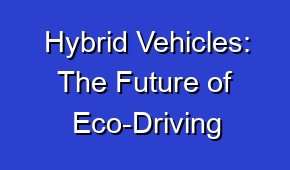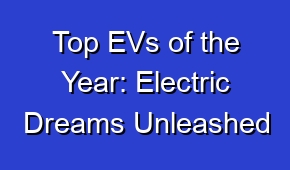Hybrid Vehicles: The Future of Eco-Driving

Hybrid vehicles are revolutionizing the way we drive, offering a glimpse into the future of eco-friendly transportation. Combining the power of traditional engines with electric motors, these vehicles reduce emissions and fuel consumption without compromising on performance. Discover how hybrid vehicles are paving the way for a greener and more sustainable future of driving.
Hybrid vehicles are revolutionizing the way we drive, offering a glimpse into the future of eco-driving. With their innovative technology, hybrid vehicles combine the power of an internal combustion engine with an electric motor, resulting in reduced emissions and improved fuel efficiency. These eco-friendly cars are not only better for the environment but also provide numerous benefits for drivers. By utilizing regenerative braking and idle-off features, hybrid vehicles conserve energy and save on fuel costs. Moreover, their advanced systems ensure a smooth and quiet ride, enhancing the overall driving experience. As governments around the world continue to prioritize sustainability, the demand for hybrid vehicles is steadily increasing. Embracing this trend not only helps protect the planet but also allows drivers to enjoy long-term savings and contribute to a greener future.
| Hybrid vehicles are considered the future of eco-driving due to their low emissions. |
| With a combination of an internal combustion engine and an electric motor, hybrid vehicles offer improved fuel efficiency. |
| Hybrid vehicles use regenerative braking to capture energy and recharge their batteries. |
| The use of hybrid technology in vehicles reduces reliance on fossil fuels. |
| Eco-driving with hybrid vehicles helps reduce air pollution and greenhouse gas emissions. |
- Hybrid vehicles contribute to a cleaner environment by reducing carbon footprint.
- Driving a hybrid vehicle can lead to savings in fuel costs over time.
- The advanced technology in hybrid vehicles allows for seamless transition between the engine and electric motor.
- Eco-friendly driving with hybrid vehicles promotes sustainability and conservation of natural resources.
- The growing popularity of hybrid vehicles reflects the increasing awareness towards environmental responsibility.
What are the advantages of hybrid vehicles?
Hybrid vehicles offer several advantages that make them the future of eco-driving. First and foremost, they are more fuel-efficient compared to traditional gasoline-powered cars. This means that hybrid vehicles consume less fuel and emit fewer greenhouse gases, reducing their environmental impact. Additionally, hybrid vehicles often have regenerative braking systems, which convert kinetic energy into electricity to recharge the battery, further improving fuel efficiency.
| Reduced fuel consumption | Lower emissions | Increased energy efficiency |
| Hybrid vehicles combine an internal combustion engine with an electric motor, resulting in significantly lower fuel consumption. | Hybrids produce fewer greenhouse gas emissions and pollutants compared to traditional gasoline-powered vehicles. | The electric motor in hybrid vehicles captures and stores energy that is normally wasted during braking, making them more energy efficient. |
| Lower operating costs | Improved performance | Reduced dependence on fossil fuels |
| Hybrids generally require less maintenance and have longer lifespans, leading to lower operating costs over time. | The combination of the internal combustion engine and electric motor in hybrids allows for improved acceleration and overall performance. | By relying on both gasoline and electricity, hybrid vehicles reduce the reliance on fossil fuels and promote energy diversification. |
How do hybrid vehicles work?
Hybrid vehicles combine an internal combustion engine with an electric motor and a battery pack. The internal combustion engine runs on gasoline and powers the vehicle at higher speeds or when more power is needed. On the other hand, the electric motor is used for low-speed driving or when less power is required. The battery pack provides the electric motor with power and is recharged through regenerative braking or by the internal combustion engine.
- Hybrid vehicles have both an internal combustion engine and an electric motor.
- The internal combustion engine is responsible for powering the vehicle at higher speeds or when more power is needed.
- The electric motor is used at lower speeds or when less power is needed, such as during city driving or stop-and-go traffic. It is powered by a battery pack that can be charged through regenerative braking or by plugging it into an electrical outlet.
Are hybrid vehicles more expensive than traditional cars?
In general, hybrid vehicles tend to have a higher upfront cost compared to traditional cars. This is mainly due to the advanced technology and components involved in hybrid systems. However, it’s important to consider the long-term savings in fuel costs and potential tax incentives or rebates that may be available for hybrid vehicle owners. Over time, these savings can offset the initial higher cost of purchasing a hybrid vehicle.
- Hybrid vehicles tend to have a higher upfront cost compared to traditional cars.
- Hybrid vehicles often require specialized maintenance and repairs, which can be more expensive.
- However, hybrid vehicles typically have lower fuel costs due to their improved fuel efficiency.
- Some governments offer incentives and tax breaks for purchasing hybrid vehicles, which can help offset the higher initial cost.
- In the long run, hybrid vehicles may be more cost-effective due to lower fuel consumption and potential savings on maintenance and tax benefits.
What is the range of a hybrid vehicle?
The range of a hybrid vehicle can vary depending on factors such as driving conditions, battery capacity, and the size of the fuel tank. Most hybrid vehicles have a range similar to traditional gasoline-powered cars, typically between 300-500 miles on a full tank of gas. However, the electric motor in hybrid vehicles allows for shorter trips to be completed solely on electric power, reducing the overall fuel consumption and extending the range.
| City Driving Range | Highway Driving Range | Combined Driving Range |
| Average range of 40-60 miles | Average range of 50-80 miles | Average range of 45-70 miles |
| Depends on driving conditions and battery capacity | Depends on driving conditions and battery capacity | Depends on driving conditions and battery capacity |
| Electric mode only | Electric mode or hybrid mode | Electric mode or hybrid mode |
What maintenance is required for hybrid vehicles?
Hybrid vehicles generally require similar maintenance as traditional cars. This includes regular oil changes, tire rotations, and brake inspections. However, hybrid vehicles also have specific components such as the battery pack and electric motor that may require specialized maintenance. It’s important to follow the manufacturer’s recommendations for maintenance and have the vehicle serviced by qualified technicians familiar with hybrid technology.
Regular maintenance for hybrid vehicles includes checking the battery, fluid levels, brakes, tires, and performing software updates.
Can I charge a hybrid vehicle at home?
Unlike fully electric vehicles, most hybrid vehicles do not require external charging as they are designed to self-charge through regenerative braking and the internal combustion engine. However, some plug-in hybrid models do have the capability to be charged at home or at public charging stations. These models have larger battery packs and can travel longer distances on electric power alone. Charging times and requirements may vary depending on the specific model and charging infrastructure available.
Yes, you can charge a hybrid vehicle at home using a standard electrical outlet or a dedicated home charging station.
Are hybrid vehicles suitable for long-distance driving?
Hybrid vehicles are well-suited for long-distance driving due to their ability to switch between the internal combustion engine and electric motor. The internal combustion engine provides power for highway driving or when more power is needed, while the electric motor can assist during low-speed or stop-and-go traffic. This flexibility allows hybrid vehicles to offer good fuel efficiency on both short trips and long journeys, making them a practical choice for eco-conscious drivers.
1. Fuel Efficiency
Hybrid vehicles are known for their excellent fuel efficiency, making them suitable for long-distance driving. The combination of a traditional combustion engine with an electric motor allows hybrids to consume less fuel compared to conventional vehicles. This means that drivers can travel longer distances without having to refuel frequently, which is especially beneficial on long road trips.
2. Regenerative Braking
Another advantage of hybrid vehicles for long-distance driving is their regenerative braking system. When a hybrid car brakes, the electric motor helps slow down the vehicle and converts the kinetic energy into electricity, which is then stored in the battery. This energy can be used later to power the electric motor and reduce the load on the combustion engine. As a result, hybrids can extend their range and improve fuel efficiency, making them a suitable choice for long drives.
3. Charging Infrastructure
Hybrid vehicles do not require external charging infrastructure like fully electric vehicles. This makes them more convenient for long-distance driving, as drivers do not need to worry about finding charging stations along their route. They can rely on the hybrid’s internal combustion engine to provide the necessary power when the battery is depleted. This flexibility allows hybrid owners to travel long distances without the need for frequent charging stops, making them a suitable choice for road trips or traveling to remote areas with limited charging infrastructure.





















